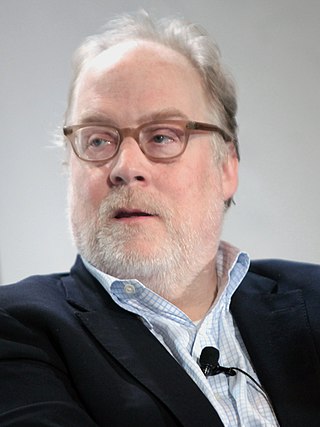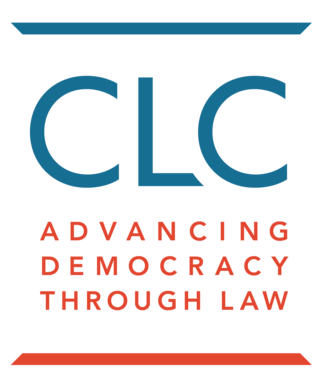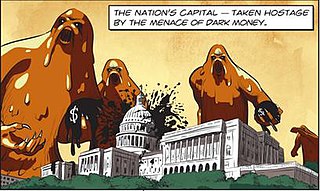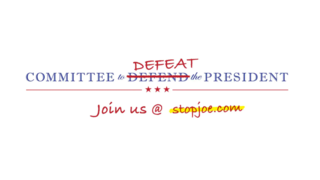In the United States, a political action committee (PAC) is a tax-exempt 527 organization that pools campaign contributions from members and donates those funds to campaigns for or against candidates, ballot initiatives, or legislation. The legal term PAC was created in pursuit of campaign finance reform in the United States. Democracies of other countries use different terms for the units of campaign spending or spending on political competition. At the U.S. federal level, an organization becomes a PAC when it receives or spends more than $1,000 for the purpose of influencing a federal election, and registers with the Federal Election Commission (FEC), according to the Federal Election Campaign Act as amended by the Bipartisan Campaign Reform Act of 2002. At the state level, an organization becomes a PAC according to the state's election laws.

EMILYs List is an American political action committee (PAC) that aims to help elect Democratic female candidates in favor of abortion rights to office. It was founded by Ellen Malcolm in 1985. The group's name is an acronym for "Early Money Is Like Yeast". Malcolm commented that "it makes the dough rise". The saying refers to a convention of political fundraising: receiving many donations early in a race helps attract subsequent donors. EMILYs List bundles contributions to the campaigns of Democratic women in favor of abortion rights running in targeted races.
A 527 organization or 527 group is a type of U.S. tax-exempt organization organized under Section 527 of the U.S. Internal Revenue Code. A 527 group is created primarily to influence the selection, nomination, election, appointment or defeat of candidates to federal, state or local public office.
An independent expenditure, in elections in the United States, is a political campaign communication that expressly advocates for the election or defeat of a clearly identified candidate that is not made in cooperation, consultation or concert with; or at the request or suggestion of a candidate, candidate's authorized committee, or political party. If a candidates agent, authorized committee, party, or an "agent" for one of these groups becomes "materially involved", the expenditure is not independent.

The financing of electoral campaigns in the United States happens at the federal, state, and local levels by contributions from individuals, corporations, political action committees, and sometimes the government. Campaign spending has risen steadily at least since 1990. For example, a candidate who won an election to the House of Representatives in 1990 spent on average $407,600, while the winner in 2022 spent on average $2.79 million; in the Senate, average spending for winning candidates went from $3.87 million to $26.53 million.

Michael Ellis Murphy is a Republican political consultant, entertainment industry writer, and producer. He advised Republicans including John McCain, Jeb Bush, David Dreier, John Engler, Tommy Thompson, Spencer Abraham, Christie Whitman, Lamar Alexander, Meg Whitman, and Arnold Schwarzenegger. Until January 2006, he was an adviser to Republican Mitt Romney. Murphy resigned his position with Romney when his former client John McCain made it clear he would also pursue the Republicans presidential nomination in 2008; Murphy decided to be neutral in the contest between them. Murphy is a vocal Republican critic of President Donald Trump. He endorsed Democratic candidate Joe Biden in the 2020 U.S. Presidential election.
In the 2008 United States presidential election, fundraising increased significantly compared to the levels achieved in previous presidential elections.
In the United States, the invisible primary, also known as the money primary, is the period between (1) the first well-known presidential candidates with strong political support networks showing interest in running for president and (2) demonstration of substantial public support by voters for them in primaries and caucuses. During the money primary candidates raise funds for the upcoming primary elections and attempt to garner support of political leaders and donors, as well as the party establishment. Fund raising numbers and opinion polls are used by the media to predict who the front runners for the nomination are. This is a crucial stage of a campaign for the presidency, as the initial frontrunners who raise the most money appear the strongest and will be able to raise even more money. On the other hand, members of the party establishment who find themselves losing the invisible primary, such as Mitt Romney in the 2016 race, may abandon hope of successfully running.
The American Leadership Project (ALP) was a political organization in the United States, active during the 2008 Democratic presidential primary elections and the subsequent presidential election. It was an unincorporated association organized under section 527 of the IRS code, formed in February 2008. The ALP did not endorse any candidate, and was not officially linked with any candidate's committee, but ran adverts before primary elections in the states of Texas, Ohio, Pennsylvania, and Indiana in support of Hillary Clinton and against Barack Obama. After the conclusion of the primary season, when Obama became the Democratic nominee, the organization ran several campaign ads against his Republican opponent John McCain.
Citizens United v. Federal Election Commission, 558 U.S. 310 (2010), is a landmark decision of the Supreme Court of the United States regarding campaign finance laws and free speech under the First Amendment to the U.S. Constitution. The court held 5–4 that the freedom of speech clause of the First Amendment prohibits the government from restricting independent expenditures for political campaigns by corporations, nonprofit organizations, labor unions, and other associations.

Campaign Legal Center (CLC) is a nonprofit 501(c)(3) government watchdog group in the United States. CLC supports strong enforcement of United States campaign finance laws. Trevor Potter, former Republican chairman of the Federal Election Commission, is CLC's founding president.

In politics, particularly the politics of the United States, dark money refers to spending to influence elections, public policy, and political discourse, where the source of the money is not disclosed to the public.
Priorities USA Action is a progressive political action committee and is the largest Democratic Party super PAC. Founded in 2011, it supported Barack Obama's 2012 re-election campaign. It was the primary super PAC supporting Hillary Clinton's 2016 presidential campaign and Joe Biden's 2020 presidential campaign. It focuses mainly on high-dollar donors.
Hillary Clinton is an American politician from the state of New York who was the Democratic Party's 2016 nominee for president of the United States. Clinton is the first woman in U.S. history to be nominated for president of the United States by a major political party. She was defeated in the 2016 general election by Republican Donald Trump.

The 2016 presidential campaign of Gary Johnson, the 29th Governor of New Mexico, was announced on January 6, 2016, for the nomination of the Libertarian Party for President of the United States. He officially won the nomination on May 29, 2016, at the Libertarian National Convention in Orlando, Florida, receiving 56% of the vote on the second ballot. Former Massachusetts Governor William Weld was endorsed by Johnson for the Libertarian vice-presidential nomination, which he also received on May 29, 2016.
Unintimidated is a pro-Scott Walker super PAC. The PAC was formed in April 2015 by some of Walker's campaign aides to assist with fundraising efforts. It is led by Keith Gilkes, Walker's former chief of staff.
Right to Rise is a political action committee (PAC) created to support Jeb Bush in the 2016 presidential election. A Super PAC, Right to Rise is permitted to raise and spend unlimited amounts of corporate, union, and individual campaign contributions under the terms of the Citizens United Supreme Court decision.

The Hillary Victory Fund was a joint fundraising committee for Hillary for America, the Democratic National Committee (DNC), and 33 state Democratic committees. As of May 2016, the Fund had raised $61 million in donations.

Correct the Record was a hybrid PAC/super PAC founded by David Brock. It supported Hillary Clinton's 2016 presidential campaign. The PAC aimed to "find and confront social media users" who posted "unflattering messages about the Democratic front-runner".

The Committee to Defeat the President was first established as the hybrid Stop Hillary PAC in 2013. The PAC changed its name to the Committee to Defend the President in 2017. Ted Harvey, a former Colorado state senator, chairs the committee.








